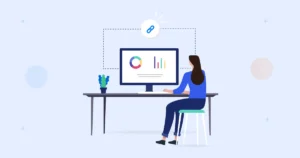White Hat Link Building Strategies: Building Your SEO Foundation
In the ever-evolving landscape of search engine optimization (SEO), one thing remains constant: the importance of backlinks. High-quality backlinks are like endorsements from other websites, signalling to search engines that your content is valuable and authoritative.
However, acquiring these valuable links is not as simple as it may seem. Enter white hat link-building strategies, the ethical and sustainable approach to boosting your website’s SEO.
In this comprehensive guide, we will explore the world of white hat link building, from its fundamental principles to advanced techniques that can help you secure those coveted backlinks. But first, let’s clarify what white hat link building entails and why it matters in the realm of SEO.
Understanding White Hat Link Building
Differentiating White Hat from Black Hat & Gray Hat Link Building
Before delving into white hat strategies, it’s crucial to understand the distinction between white hat, black hat, and gray hat link building. White hat practices adhere to search engine guidelines and are considered ethical. They prioritize creating valuable content and building genuine relationships with other websites.
On the other hand, black hat techniques involve shortcuts and manipulative tactics that violate search engine guidelines. These can lead to penalties and long-term damage to your website’s reputation. Grey hat strategies fall somewhere in between, often pushing the boundaries of acceptability.
White hat link building is not just about short-term gains; it’s about building a sustainable online presence that stands the test of time.
Importance of Ethical SEO Practices
White hat link building aligns with ethical SEO practices. These practices not only ensure that your website doesn’t get penalized by search engines but also contribute to the overall quality of the internet. By focusing on value creation and user experience, you’re not just benefiting your site but enhancing the online ecosystem.
Long-Term Benefits of White Hat Link Building
One of the primary advantages of white hat link building is its sustainability. While black hat tactics might yield quick results, they often lead to disastrous consequences in the long run. White hat strategies, on the other hand, are designed to withstand algorithm changes and updates.
When you build high-quality, relevant backlinks through ethical means, you’re building a solid foundation for long-term success. Your website becomes more resilient to algorithmic shifts, and your reputation remains intact.
Keyword Research and Target Audience Analysis
Identifying Relevant Keywords
The first step in any white hat link-building strategy is thorough keyword research. Start by identifying keywords that are relevant to your niche and align with your content. Tools like Google Keyword Planner, Ahrefs, and SEMrush can help you discover high-potential keywords.
Understanding User Intent
Keyword research goes beyond finding popular terms; it involves understanding user intent. What are people looking for when they enter a specific keyword into a search engine? Tailor your content to satisfy these intentions, and you’ll have a higher chance of attracting valuable backlinks.
Analyzing Competitor Strategies
Don’t forget to analyze your competitors’ link-building strategies. Identify which websites are linking to them and try to replicate or improve upon those efforts. Competitive analysis can provide valuable insights into the link-building landscape in your niche.
Now that we’ve laid the foundation, let’s move on to the next crucial step in white hat link building: on-page optimization.
On-Page Optimization
Creating High-Quality Content
At the heart of any successful white hat link-building strategy is high-quality content. Your content should not only be well-researched and informative but also highly engaging for your target audience.
- Keyword Optimization: Incorporate your target keywords naturally within your content, headings, and meta descriptions. Avoid keyword stuffing, which can harm your SEO efforts.
- User-Friendly Formatting: Use headings, subheadings, bullet points, and concise paragraphs to make your content easy to read and navigate.
- Engaging Multimedia: Enhance your content with images, videos, infographics, and other multimedia elements to keep your audience engaged.
Internal Linking
Incorporate internal links to connect related content on your website. Internal linking helps distribute link equity throughout your site and provides a better user experience by guiding visitors to relevant information.
Mobile Optimization
In an era where mobile traffic is prevalent, ensure that your website is fully optimized for mobile devices. Mobile-friendly websites not only rank higher but also offer a better experience to users across various devices.
These are the initial sections of the article, and you can continue by expanding on the remaining sections of the outline. Remember to provide real-life examples and practical advice to make the content more valuable to your readers.
Content Outreach and Promotion
Identifying Influencers and Authorities
Once you’ve created valuable content, the next step is to promote it effectively. Start by identifying influencers and authorities in your niche. These individuals or organizations can greatly amplify your content’s reach.
Reach out to them and build genuine relationships. Remember, the goal is not just to get them to share your content but to establish lasting connections that can lead to future collaborations.
Crafting Personalized Outreach Emails
When reaching out to potential link partners or influencers, personalized outreach is key. Generic, mass-sent emails are easily ignored. Craft well-researched and personalized emails that explain why your content would be valuable to their audience.
Social Media Engagement
Leverage social media platforms to promote your content. Share your articles, infographics, and videos across your social channels, and encourage your followers to do the same. Engaging with your audience on social media can also help foster a sense of community and loyalty.
Guest Posting
Guest posting on reputable websites in your niche is a tried-and-true white hat link building strategy. Write high-quality guest posts that provide value to the host website’s audience. In return, you can often include a relevant link back to your own content.
Content Syndication
Consider syndicating your content on platforms that allow it, such as Medium or LinkedIn. Syndication can expose your content to a broader audience and potentially attract backlinks from other content creators who discover your work.
Building High-Quality Backlinks
Natural Link Building vs. Manual Link Building
While manual link building is a common practice, the ideal scenario is to earn backlinks naturally. This means that other websites link to your content because they genuinely find it valuable.
However, it’s often necessary to initiate the process through manual outreach. When doing so, focus on websites that are relevant to your content and have good domain authority.
Leveraging Relationships with Industry Peers
Building relationships with peers in your industry can be mutually beneficial. Collaboration often leads to organic backlinks as you reference each other’s work. Attend industry events, join forums, and participate in discussions to expand your network.
Building Relationships with Niche Bloggers
Niche bloggers can be valuable allies in your link-building efforts. Establish connections with bloggers who specialize in your field and offer to provide guest posts or collaborate on projects.
Participating in Industry Forums and Communities
Engaging in industry-specific forums and online communities allows you to showcase your expertise and occasionally share relevant links to your content. Just be sure to follow community guidelines and avoid spammy practices.
Creating Shareable Infographics and Visual Content
Visual content, such as infographics and data visualizations, has a high shareability factor. Create visually appealing content that others will want to feature on their websites, providing credit with a backlink.
Now that you’ve started building links, it’s crucial to ensure that the content you’re linking to is of the highest quality.
Earning Links through Content Excellence
Creating Comprehensive, Authoritative Content
In the world of white hat link-building, content is king. Your content should not only address your audience’s needs but also be comprehensive and authoritative. When your content is the go-to resource in your niche, others are more likely to link to it.
Case Studies and Original Research
Original research and case studies can be powerful link magnets. Conduct your own research, gather data, and present your findings in a way that’s both informative and visually appealing. This can position your content as an industry authority.
Content Collaboration and Co-Creation
Collaborating with other experts in your field to create content can lead to valuable backlinks. Co-authored articles, round-up posts featuring multiple experts, or collaborative research projects can all attract attention and links.
Monitoring and Measuring Link Building Efforts
Tracking Backlinks
Use backlink analysis tools such as Ahrefs, Moz, or SEMrush to keep tabs on the links pointing to your website. Regularly monitor for new backlinks as well as changes in existing ones.
Assessing the Quality of Backlinks
Not all backlinks are created equal. Focus on the quality rather than the quantity of links. High-authority websites and those relevant to your niche carry more weight in search engine rankings.
Measuring the Impact on SEO Rankings
Track the impact of your link-building efforts on your SEO rankings. Tools like Google Analytics and Google Search Console can help you gauge improvements in organic traffic and keyword rankings.
Using Tools for Link Analysis
Leverage link analysis tools to identify potential opportunities and areas for improvement. These tools can help you discover new linking prospects and evaluate your competition’s link profiles.
Staying Updated with SEO Trends
Adapting to Algorithm Changes
Search engine algorithms are constantly evolving. Stay informed about updates and changes to ensure your link-building strategies remain effective and compliant with search engine guidelines.
Continuous Learning and Skill Development
Invest in your SEO skills and knowledge. Attend webinars, read industry blogs, and consider certifications to stay up-to-date with the latest SEO trends and best practices.
Avoiding Common White Hat Link Building Pitfalls
Link Farms and Spammy Practices
Steer clear of link farms and other spammy practices that can lead to search engine penalties. Always prioritize quality over quantity when building links.
Low-Quality Directories
Avoid submitting your website to low-quality directories. Instead, focus on reputable and industry-specific directories that can provide genuine value.
Over-Optimization
Keyword stuffing and over-optimization of anchor text can be detrimental. Keep your anchor text natural and relevant to the content it links to.
Ignoring User Experience
Remember that user experience matters. A website with excellent navigation, fast loading times, and mobile optimization not only attracts more visitors but also earns more backlinks.
Case Studies
Examples of Successful White Hat Link-Building Campaigns
Provide real-life examples of websites that have successfully implemented white hat link-building strategies. Highlight the tactics they used and the outcomes they achieved.
Lessons Learned from Real-World Scenarios
Share lessons and insights from actual link-building campaigns. Discuss challenges faced and how they were overcome, providing actionable takeaways for your readers.
Conclusion
In conclusion, white hat link building is an essential element of a successful SEO strategy. By following ethical practices and focusing on content excellence, relationship building, and continuous improvement, you can enhance your website’s authority and visibility in search engine results pages.
Remember that white hat link building is not a quick fix but a long-term investment in your online presence. Over time, the backlinks you earn through ethical means will contribute to sustainable growth and higher search engine rankings.








Good post. I learn one thing more difficult on completely different blogs everyday. It would always be stimulating to learn content material from different writers and observe somewhat something from their store. I’d choose to use some with the content material on my weblog whether or not you don’t mind. Natually I’ll provide you with a link on your internet blog. Thanks for sharing.
I am not really wonderful with English but I find this really easygoing to translate.
This really answered my downside, thanks!